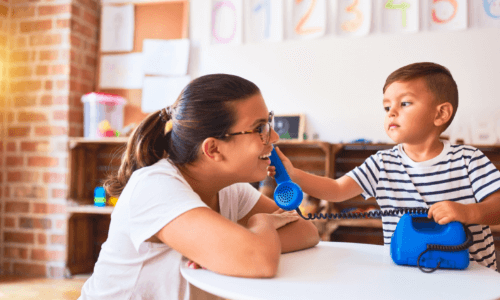 Could music be the key to unlocking your child’s potential? For children who experience challenges with sensory processing, difficulty listening or focusing as well as communicating with others, the use of therapeutic listening techniques in Early Intervention can make a difference!
Could music be the key to unlocking your child’s potential? For children who experience challenges with sensory processing, difficulty listening or focusing as well as communicating with others, the use of therapeutic listening techniques in Early Intervention can make a difference!
What is Therapeutic Listening?
“Therapeutic listening is a sound based intervention that triggers a child’s attention through a connection within their nervous system,” explains Jennifer Schreiner, a teli Occupational Therapist certified in Therapeutic Listening. Jennifer is one of only a limited number of Western Pennsylvania certified therapeutic listening practitioners providing home based services to her clients.
Our sensory system has an impact on our overall body, both physically and behaviorally. The auditory system is no different. It is connected to all levels of brain function. Therapeutic listening is an important tool in Early Intervention that can help children make connections that they may be missing.
“You know the feeling when you hear your favorite song; you may tap your toes, sway to the beat, or sing the words. Your ability to listen requires that you pay close attention,” remarks Jennifer. ” While you may take this for granted, some children have difficulty interpreting and focusing on their environment. When focus is an issue, therapeutic listening can help a child begin to listen with their whole body – behaviorally, mentally and physically.”
How does Therapeutic Listening work?
Therapeutic Listening incorporates the experience of listening to a series of musical selections through specially designed headphones over a 30-minute session, 2 times per day. ” Dependent on a child’s difficulties with mild to severe sensory processing we will introduce music that varies in pitch, frequency and rhythm. There is an evidenced based sequence that is followed to optimize the impact,” notes Jennifer. “We then observe the child before, during and after the listening sessions in their normal routine to assess the impact and fine tune the plan.”
“While the therapy involves some trial and error, we have been able to see a calming effect on children during the first few minutes of the session, as well as after a series of sessions,” remarks Jennifer. “A number of parents have commented that the benefits have extended into their daily routine, which is the ultimate goal of the therapy.”
How are children helped by Therapeutic Listening?
For children with a diagnosis of Autism Spectrum Disorder, Attention Deficit or other disorders, where sensory processing is an issue, some of the results may include:
- Greater attention and engagement with their environment
- Enhanced sense of calmness
- Better ability to tolerate transitions from play time to nap time, etc.
- Improved social participation
- Increased ability to communicate
- Better self-regulation
- Improved coordination and balance and muscle control
- Improved ability to follow directions
How do I get help for my child?
We can help! An assessment of your child’s needs is required from which an initial trial will begin the path toward a proper treatment plan. The music selection, desired repetition and duration of the program is individualized dependent on your child’s requirements.
If you are interested in learning more about how early intervention can help therapeutic listening and sensory processing challenges, call us at 412-922-8322.


